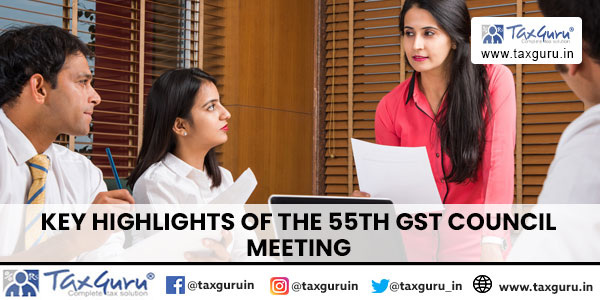The 55th GST Council Meeting, held on December 21, 2024, brought several key recommendations affecting goods, services, and compliance. GST rates on various items were revised, such as a reduction for Fortified Rice Kernel (FRK) and gene therapy, along with rate hikes for used vehicles and AAC blocks. New tax rules for services included a shift of sponsorship services to forward charge and exemptions for RBI-regulated payment aggregators. The definition of pre-packaged goods was expanded to include items under 25 kg or 25 liters. A new clause in the GST Act clarified that goods in SEZs or FTWZs, before export clearance, are not considered a supply. Other key changes included the taxability of vouchers, a waiver of late fees for GSTR-9C filings, and amendments to the GST Act, such as replacing “plant or machinery” with “plant and machinery” and reducing the pre-deposit for appeal cases. While these recommendations aim to simplify tax compliance, final notifications are still pending. Taxpayers should stay informed to adjust to these evolving provisions effectively.
Arjuna (Fictional Character): Krishna, as we are prepared to welcome the New Year, I hear that the 55th GST Council Meeting held on 21.12.2024 also brought several new recommendations. Can you enlighten me on these changes?

Krishna (Fictional Character): Arjuna, just as the New Year symbolizes new beginnings, the 55th GST Council Meeting has introduced transformative recommendations for taxpayers and businesses. These recommendations touch upon rates, compliance mechanisms, clarifications, amendments and much more.
Arjuna (Fictional Character): Krishna, what are the key major recommendations made by the GST council?
Krishna(Fictional Character): Arjuna, the key recommendations are discussed below. Let me break them down for you:
1. Changes in GST Rates for Goods:
- GST rate on Fortified Rice Kernel (FRK) to be reduced from 18% to 5%.
- The Gene therapy to be fully exempted from GST.
- The GST rate on the sale of used vehicles including EV’s, has increased from 12% to 18%, but it will apply only to the margin of the supplier.
- Autoclaved Aerated Concrete (AAC) blocks with over 50% fly ash content will now attract a GST rate of 12%. Earlier, only blocks with over 90% fly ash content were taxed at 12%.
- Fresh green or dried pepper and raisins supplied by agriculturists are to be exempted from GST.
- Popcorn mixed with salt and spices is categorized under HSN 21069099, attracting 5% GST if supplied as non-pre-packaged & non-labelled, and 12% GST if supplied as pre-packaged & labelled. On the other hand, popcorn mixed with sugar (caramel popcorn) is classified under HSN 17049090 as sugar confectionery and attracts 18% GST.
2. Changes Related to Services:
- Sponsorship services provided by body corporates are recommended to tax under the Forward Charge instead of Reverse Charge (RCM).
- Taxpayers registered under Composition Scheme are excluded from GST under RCM for renting commercial property from unregistered dealers.
- RBI-regulated payment aggregators are exempt from GST. Also, GST will not apply to penal charges imposed by banks/NBFCs for non-compliance with loan terms.
- Hotel Accommodations services: Omitting Declared Tariff Definition: The emphasis shifts from the declared tariff to the actual value of supply for hotel accommodations. The definition of “specified premises” will be updated accordingly.
GST on Restaurant Services: If the value of supply for any accommodation unit exceeds ₹7,500 in the Previous FY, restaurant services will attract 18% GST with ITC. If not, then restaurant services will attract 5% GST without ITC. However, Hotels can opt to pay 18% GST with ITC by submitting a declaration within time specified.
3. Pre-packaged and Labelled Goods definition: The definition of pre-packaged goods recommended to be expanded to include all commodities under 25 kg or 25 litres in case of retail sale.
4. New Clause (aa) is recommended under Sch III of the GST Act: The clause state that the supply of goods stored in SEZs or Free Trade Warehousing Zones (FTWZ) to any person before clearance for export or to the Domestic Tariff Area (DTA), should not be considered as supply.
5. Recommendation on Taxability of Vouchers: Voucher transactions are neither be treated as a supply of goods nor services. However, Commission on voucher distribution by agents will attract GST. Further, unredeemed Vouchers should not attract GST.
6. Late Fees Waiver: The GST Council has made a recommendation to waive the late fee for delayed filing of GSTR-9C for the Period 2017-2018 to 2022-2023 provided GSTR-9C is filed by 31st March 2025.
7. Amendments recommended to be made under GST Act:
- The term “plant or machinery” in Section 17(5)(d) has to be replaced with “plant and machinery” retrospectively from 1st July 2017.
- The pre-deposit requirement for filing appeals where dispute is related to only penalties to be reduced from 25% to 10%.
The taxpayers note that these are just the recommendations, and the final notification is yet to come.
Arjuna (Fictional Character): Okay Krishna, what lessons should taxpayers learn from these recommendations?
Krishna (Fictional Character): Arjuna, these recommendations emphasize simplification and adaptability. Just as the New Year symbolizes hope and renewal, these GST recommendations are a roadmap to better compliance and growth. With awareness and timely action, taxpayers can embrace 2025 with confidence and clarity.




